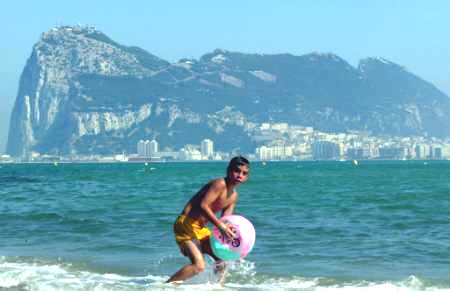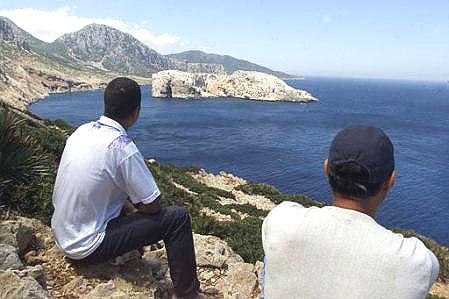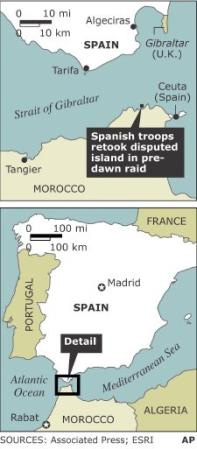The fight (sort of) for the Pillars of Hercules
Territorial disputes amongst nations are the perennial causes of wars or, at best, catalysts for an interest in geography, history and travel. For now, never mind Israel and Palestine, Kashmir, Sakhalin Island or the South China Sea. Let us journey to the two fabled Pillars of Hercules: Gibraltar and Ogigia. The relative obscurity of the latter shall be explained shortly.
-

-
Gibraltar, seen from La Linea de la Concepcion, Spain. Reuters photo by Marcelo del Pozo
As a formality ending the War of Spanish Succession in 1713, Spain signed a treaty with Britain in Utrecht, agreeing that the British could keep the Rock of Gibraltar they captured while they were there, but once they would leave it was to be returned to Spain at once. The Brits, knowing a good deal when they saw it, have stayed put ever since. With a naval base checking maritime traffic between the Mediterranean and the Atlantic, the Rock's strategic worth proved itself many times, notably during the Napoleonic wars of the early 19th century, and World War II of 1939-1945.
Today, Gibraltar still has its naval base and fortress, but its main function now is that of a holiday venue: a scenic peninsula of mythic allure, hosted by a Latinized community of 35,000 Britons speaking in a distinct accent at the nexus of Europe and Africa. London wants to "share sovereignty" over everything except the military installations, Madrid concurs but still wants everything back eventually, and the British Gibraltarians themselves want to determine their own fate over a referendum vote, if only to keep things exactly as they have been since 1713.

Isla Perejil / Leila, seen from Bel Younech, Morocco. AP photo by Santiago Lyon
Across the Strait of Gibraltar, about fifty goats kept by the Moroccan coastal village of Bel Younech are the only permanent residents of the other Pillar, which Homer called Ogigia. Known to the Moroccans as Leila, the Isle of Night, the 13-hectare (30 acre) islet is named Perejil by the Spaniards for its wild parsley, much already devoured by the goats. Separated from Bel Younech by a 200-yard swim, it is a short boat ride from there to Ceuta, one of the two North African enclaves retained by Spain after ruling much of northern Morocco as a protectorate from 1668 to 1956. (The other, Melilla, is 200 miles away to the east. Morocco has long insisted upon the return of these prosperous ports, which thrive on fishing, the ferry traffic across the Mediterranean, and the black market of consumer goods, tobacco and narcotics.)
 |
Leila/Perejil was but a goat pen and playground for the locals until recently, when both Spain and Morocco were concerned about its being a drop-off point for drug smugglers and illegal immigrants. For this, fear of international terrorism (that's always the reason for something these days), or simply the nationalistic euphoria prompted by the royal wedding of King Mohammed VI, six Moroccan soldiers brought a tent and a flag there on the 11th of July, 2002. Having given up the sparsely-populated Western Sahara to the Moroccan army in 1975, Spain is now loathe to lose Melilla and Ceuta, for which Isla Perejil is regarded as an outpost. Thus Madrid sent the six Moroccans home from their five-day camping trip with helicopter-borne marines, gunboats and a frigate, emphatically raising two Spanish flags there. Rabat called the Spanish show of force a "declaration of war," but so far the only Moroccan resistance came from the village children, firing their slingshots from the mainland. Madrid said it would pull back once Rabat gave its assurance of not reoccupying the island. My humble advice for these international crises is thus: First, hold a few rounds of conciliatory talks inside an elegant hotel in Monte Carlo. Let the people of Gibraltar, Melilla and Ceuta enjoy their status quo, however anachronistic as it seems. Keep the patrol boats in the area to be on the lookout for illegal traffickers, but also start sending in tour boats, cruise ships and the like. Develop the North African coast with European capital, thereby enriching the entire Mediterranean rim and addressing the problem of illegal immigration at its economic core. |
Charles Weng, 17 July 2002, information and graphics courtesy of the Associated Press, Reuters and the BBC